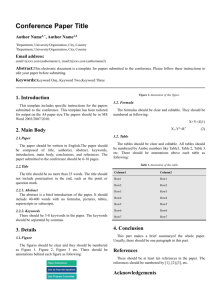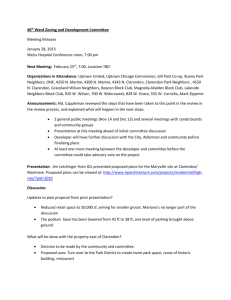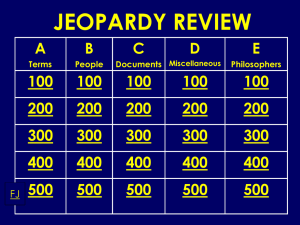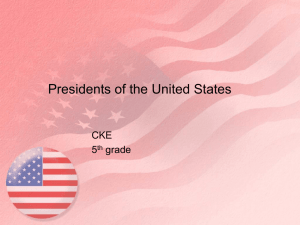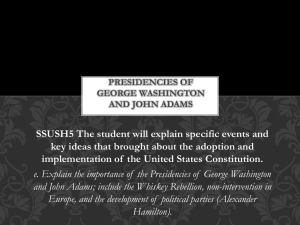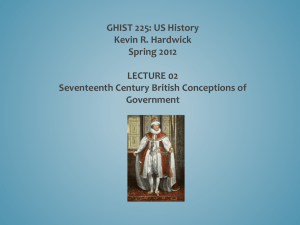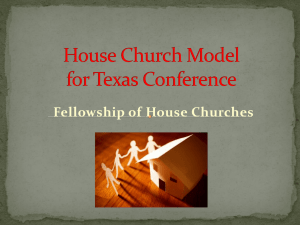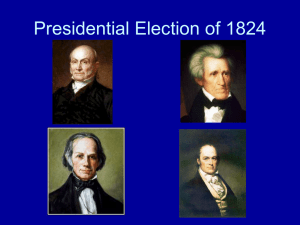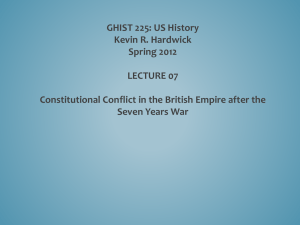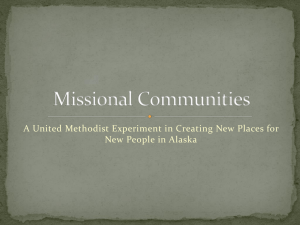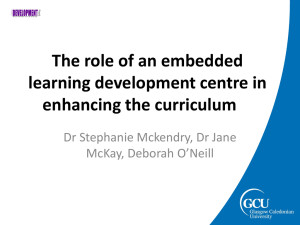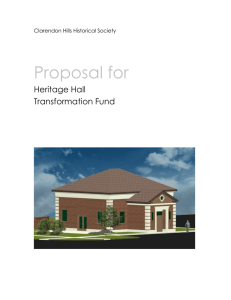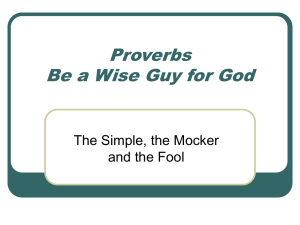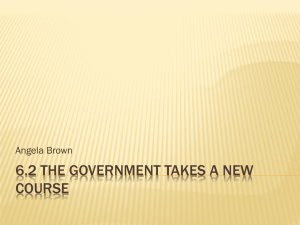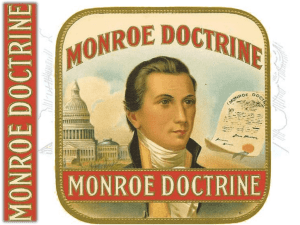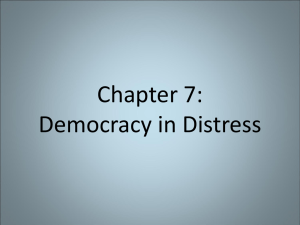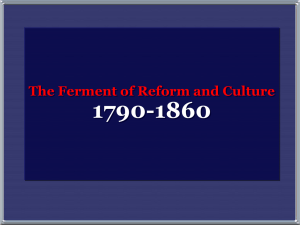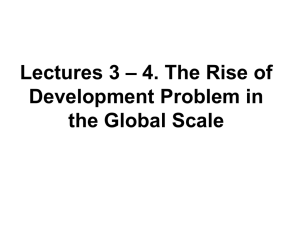PP 06 English Political Thought in Colonial America
advertisement
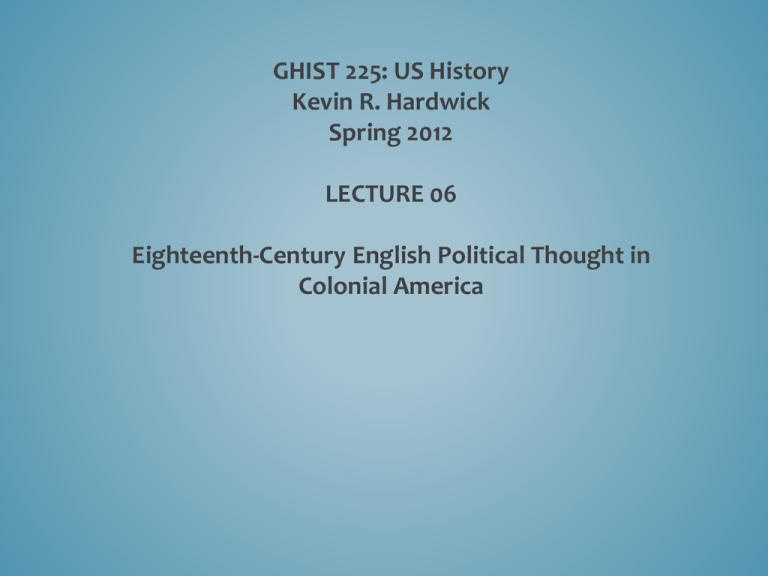
GHIST 225: US History Kevin R. Hardwick Spring 2012 LECTURE 06 Eighteenth-Century English Political Thought in Colonial America Part One: English Political Thought in the Colonies: A Case Study Part Two: The “Rights of Englishmen” and the Colonial Legislatures Documents: 1. John Wise, “A Vindication of New England Churches,” (1717) in CAPCT, Vol. 1, pp. 80-84 2. John Adams, Clarendon No. 3, (1766), in CAPCT, Vol. 1, pp. 182-185 3. Sir John Randolph, Re-election Speech, (1736), in CAPCT, Vol. 1, pp. 96-97 English Political Thought in the Colonies • Natural Law and natural rights; • The faculty psychology, with its elevation of human rationality as approaching the divine; • Social contract theory, especially as explained by John Locke, with its emphasis on popular sovereignty; • The celebration of the English Constitution as established by the Glorious Revolution, with its “mixed” and “balanced” elements of Monarchy, Aristocracy, and Democracy. A Case Study: John Wise, “A Vindication of New England Churches,” 1717 “Wise's most important political writings, The Churches Quarrel Espoused (1710) and A Vindication of the Government of New-England Churches (1717), were contributions to a protracted battle in the early eighteenth century over the governance of New England's established Congregational church. Led by Cotton Mather and Increase Mather, the more conservative ministers sought to establish a Presbyterian church polity, in which consociations of clergy would rule on doctrine and the acceptability of neighboring ministers instead of the congregations themselves.” William Pencak. "Wise, John"; http://www.anb.org/articles/01/01-00998.html; American National Biography Online Feb. 2000. The condition of humans in a state of nature: “a FreeBorn Subject under the Crown of Heaven, and owing Homage to none but God himself.”(p. 80) Natural rights: “Invesitutres and Immunitites which properly belong to Man separately considered.”(p. 80) Reason: “That which is to be drawn from Man’s Reason, flowing from the true Current of that Faculty, when unperverted, may be said to be the Law of Nature; on which account, the Holy Scriptures declare it written on Mens hearts.” (p. 80) “Reason is Congenate with Nature, wherein by a Law of Immutable, Instampt upon his Frame, God has provided a Rule for Men in all their Actions; obliging each one to the performance of that which is Right.” (p. 80) “A principle of Self-Love, and Self-Preservation,” (p. 81) “It follows as a fundamental Law of Nature, that Man is not so Wedded to his own Interest, but that he can make the Common good the mark of his Aim; and hence he becomes Capacitated to enter into a Civil State by the Law of Nature; for without this property in Nature, viz. Sociableness, which is for Cementing of parts, every Government would soon molder and dissolve.” (p. 81) “An Original Liberty Instampt upon [Man’s] Rational Nature.” (p. 81) “An equality among Men; Which is not to be denyed by the Law of Nature, till Man has Resigned himself with all his Rights for the sake of a Civil Society.”(p. 82) And in a peculiar manner to gratify the necessity he is in of a publick Rule and Order, he is impelled to enter into a Civil Community, and Divests himself of his Natural Freedom, and puts himself under Government; which amongst other things, Comprehends the Power of Life and Death over Him.” (p. 83) The first Humane Subject and Original of Civil Power is the People. For as they have a Power every Man over himself in a Natural State, so upon a Combination they can and do bequeath this Power unto others, and settle it according as their united discretion shall Determine. (p. 83) A Vote or Decree must then nextly pass to set up some Particular species of Government over them. And if they are joyn in their first Compact upon absolute Terms, to stand to the Decision of the first Vote concerning the species of Governent: Then all are bound by the Majority to acquiesce in that particular Form thereby settled, thought their own private Opinion, incline them to some other Model. (p. 83) “Mixt Governments, which are various and of divers kinds [not now to be Enumerated] yet possibly the fairest in the World is that which has a Regular Monarchy; [in Distinction to what is Dispotick] settled upon a Noble Democracy as its Basis. And each part of that Government is so adjusted by Pacts and Laws that renders the whole Constitution an Elisium. It is said of the British Empire, that it is such a Monarchy, as that by the necessary subordinate Concurrence of the Lords and Commons in the Making and Repealing all Statutes or Acts of Parliament; it hath the main Advantages of an Aristocracy, and of a Democracy, and yet free from the Disadvantages and Evils of either.” (p. 84) John Adams, “Clarendon No. 3,” January, 1766: What a fine reflection and consolation is it for a man to reflect that he can be subjected to no laws, which he does not make himself, or constitute some of his friends to make for him: his father, brother, neighbour, friend, a man of his own rank, nearly of his own education, fortune, habits, passions, prejudices, one whose life and fortune and liberty are to be affected like those of his constituents, by the laws he shall consent to for himself and them. [p.185] John Adams, “Clarendon No. 3,” January, 1766: The meanest and lowest of the people, are by the unalterable indefeasible laws of God and nature, as well intitled to the benefit of the air to breath, light to see, food to eat, and clothes to wear, as the nobles or the king. All men are born equal: and the drift of the British Constitution is to preserve as much of this equality as is compatible with the people’s security against foreign invasions and domestic usurpation. [p. 184] John Adams, “Clarendon No. 3,” January, 1766: A limited monarchy, or a mixture of the three forms of government commonly known in the schools, reserving as much of the monarchial splendor, the aristocratical independence, and the democratical freedom, as are necessary, that each of these powers may have a control both in legislation and execution, over the other two, for the preservation of the subject’s liberty. [p. 184] Sir John Randolph, Re-election Speech, (1736), in CAPCT, Vol. 1, pp. 96: “We are no more than the representative body of a colony, naturally and justly dependent upon the Mother Kingdom.” “All we pretend to, is to be of some importance to those who sent us hither, and to have some share in their protection, and the security of their lives, liberties, and properties.” The 1621 Charter commanded the House of Burgesses “to imitate and follow the policy, form of government, laws, customs, manner of trial, and other administration of justice used in England.”
